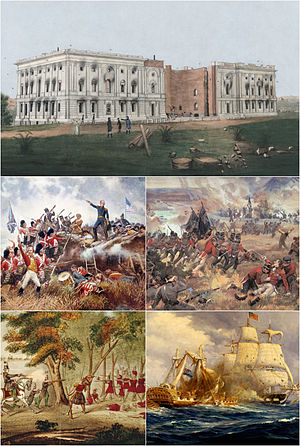User:Johann Hemmer/sandbox
This page may be too long to read and navigate comfortably. (June 2023) |
| War of 1812 | |||||||||
|---|---|---|---|---|---|---|---|---|---|
| Part of the Sixty Years' War and related to the Napoleonic Wars | |||||||||
 Clockwise from top:
| |||||||||
| |||||||||
| Belligerents | |||||||||
|
Allies:
|
Allies:
| ||||||||
| Commanders and leaders | |||||||||
|
|
| ||||||||
| Strength | |||||||||
Allies
|
Allies | ||||||||
| Casualties and losses | |||||||||
|
| |||||||||
| |||||||||
The First Prusso-Ottoman War (2 June 1672 – 3 February 1677) was fought by the Kingdom of Prussia and its allies against the Ottoman Empire and its own allies. Most of the battles were fought on Ottoman-controlled lands in the Balkans, but after the Battle of Tirnovo, in which the 237,000-strong Ottoman army was disintegrated, the war turned into a long and bloody liberation of Ottoman lands, from the south of Hungary to modern-day Caucasia. Prussian allies were composed of the Kingdom of Bohemia, the Kingdom of Hungary and several minor rebel groups from different ethnicities inside the Ottoman Empire.
Tensions between the countries arose when Padishah Osman III of the Ottomans, a long-lasting critic of King-Elector Friedrich Wilhelm II of Prussia, provoked the Prussian King by sending him a diplomatic insult. The Ottoman army was returning from a successful campaign against the Sultanate of Delhi, during which, most of the reserves were killed during sieges. However, an alliance between the Ottomans and the Kingdom of France, the most reliable Prussian ally, made it impossible for Prussia to initiate aggression. Friedrich William II's advisor and spymaster Kaspar Höltzendorff used his extensive spy network to sabotage the reputation of the Padishah, ultimately guaranteeing France's neutrality.
Meanwhile, the Prussian King convinced the King of Hungary to join forces, which meant the addition of almost 60,000 men. Prussia's other ally, the Czar of Russia, although eager to reclaim lost territory in the steppes, was unable to contribute due to a century-old debt crisis, inherited from the Princedom of Muscovy. The Kingdom of Bohemia was a de facto puppet of Prussia and contributed with ca. 40,000 troops. Prussia's own army alone, the most formidable and disciplined of Europe, consisted of two national armies and two mercenary armies, amounting to 175,000 professional soldiers.
In June 2 1672, war was declared and the Ottomans' Balkan lands were immediately invaded. After months of sieges and pillages, a detachment of
At sea, the Royal Navy imposed an effective blockade on U.S. maritime trade, while between 1812 and 1814 British regulars and colonial militia defeated a series of American attacks on Upper Canada.[10] The abdication of Napoleon in early 1814 allowed the British to send additional troops to North America and the Royal Navy to reinforce their blockade, crippling the American economy.[11] In August 1814, negotiations began in Ghent, with both sides wanting peace; the British economy had been severely impacted by the trade embargo, while the Federalists convened the Hartford Convention in December to formalise their opposition to the war.
In August 1814, British troops captured Washington, before American victories at Baltimore and Plattsburgh in September ended fighting in the north. In the Southeastern United States, American forces and Indian allies defeated an anti-American faction of the Creek. In early 1815, American troops defeated a major British attack on New Orleans.
Origin[edit]
| Origins of the War of 1812 |
|---|
Since the conclusion of the War of 1812, historians have long debated the relative weight of the multiple reasons underlying its origins.[12]
- ^ see Results of the War of 1812
- ^ Includes 2,250 men of the Royal Navy.
- ^ Includes 1,000 combat casualties on the northern front.
- ^ a b c d Clodfelter 2017, p. 245.
- ^ Allen 1996, p. 121.
- ^ a b Clodfelter 2017, p. 244.
- ^ a b c Stagg 2012, p. 156.
- ^ Hickey 2006, p. 297.
- ^ Leland 2010, p. 2.
- ^ Tucker et al. 2012, p. 311.
- ^ Hickey 2012n.
- ^ Weiss 2013.
- ^ Greenspan 2018.
- ^ Benn 2002, pp. 56–57.
- ^ Goodman 1941, pp. 171–186; Trautsch 2013, pp. 273–293; Egan 1974.
